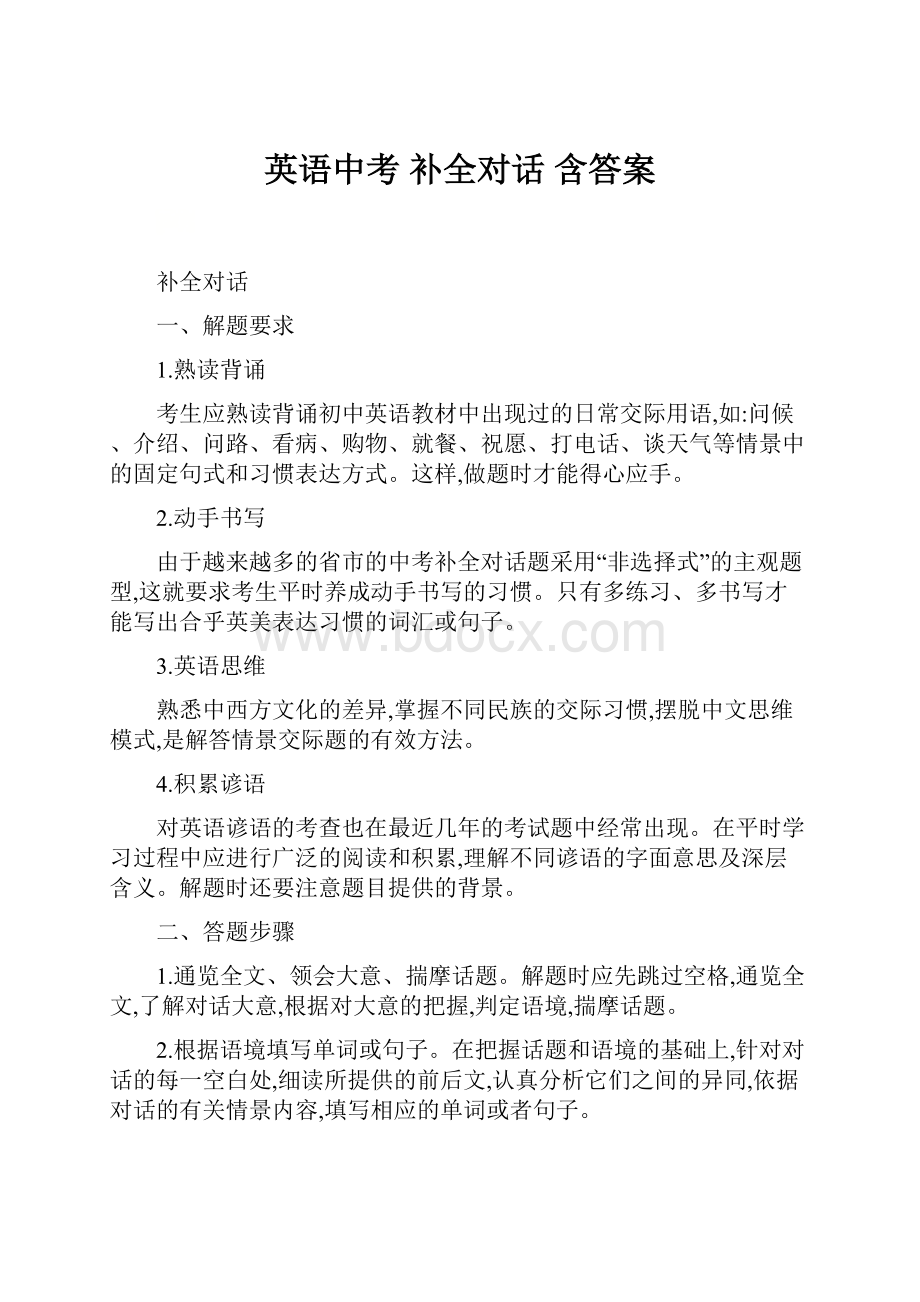英语中考 补全对话 含答案.docx
《英语中考 补全对话 含答案.docx》由会员分享,可在线阅读,更多相关《英语中考 补全对话 含答案.docx(13页珍藏版)》请在冰豆网上搜索。

英语中考补全对话含答案
补全对话
一、解题要求
1.熟读背诵
考生应熟读背诵初中英语教材中出现过的日常交际用语,如:
问候、介绍、问路、看病、购物、就餐、祝愿、打电话、谈天气等情景中的固定句式和习惯表达方式。
这样,做题时才能得心应手。
2.动手书写
由于越来越多的省市的中考补全对话题采用“非选择式”的主观题型,这就要求考生平时养成动手书写的习惯。
只有多练习、多书写才能写出合乎英美表达习惯的词汇或句子。
3.英语思维
熟悉中西方文化的差异,掌握不同民族的交际习惯,摆脱中文思维模式,是解答情景交际题的有效方法。
4.积累谚语
对英语谚语的考查也在最近几年的考试题中经常出现。
在平时学习过程中应进行广泛的阅读和积累,理解不同谚语的字面意思及深层含义。
解题时还要注意题目提供的背景。
二、答题步骤
1.通览全文、领会大意、揣摩话题。
解题时应先跳过空格,通览全文,了解对话大意,根据对大意的把握,判定语境,揣摩话题。
2.根据语境填写单词或句子。
在把握话题和语境的基础上,针对对话的每一空白处,细读所提供的前后文,认真分析它们之间的异同,依据对话的有关情景内容,填写相应的单词或者句子。
3.通盘考虑、前后联想、先易后难。
要从对话整体理解出发,依照上、下问答的逻辑顺序来考虑所选择的答案,不可不顾前后顺序,孤立地就上句就补下句,这样可能出现所补句子符合上文而不符合下文的情况。
要先解决有把握的、容易的,再回头处理较难的。
4.通读对话、义形结合、验证答案。
将对话补全之后,再将整段对话通读一遍,逐一验证答案。
所填的答案不仅语义上要符合语境,而且要保证语言正确,做到说话得体。
一
根据对话内容,在每个标有题号的空白处填入一个适当的句子,使对话完整,合乎情境。
A:
Hi,Lingling.ThisisTonyspeaking.AreyougettingreadyfortheSpringFestival?
B:
(1) .We’requitebusynow.
A:
(2) ?
B:
I’mmakingbigredlanterns. (3) ?
A:
Yes,Ilikethemverymuch.Theyareverybeautiful.Isyourfatherhelpingyou?
B:
(4) .He’sstillatwork.
A:
What’syourmotherdoing?
B:
Sheiscleaningthehouseandputtingthingsaway.
A:
Oh,Iknowyou’rebusypreparingforthefestival.Well,wishyouahappySpringFestival.
B:
(5) .
【答案】
(1)Yes,weare/Yes/Yes,Iam 根据后面一句说“我们现在很忙”可以判断,是正在为春节做准备。
故应用肯定回答。
(2)Whatareyoudoing(atthemoment/now) 根据答语可以判断,本句是在问对方正在做什么。
(3)Doyoulikelanterns/them 根据答语可以判断此处问的是:
“你喜欢灯笼/它们吗?
”
(4)No,heisnt/No 根据后面说爸爸仍然在工作可知应用否定回答。
(5)Thankyou 前一句表示祝福,此处应表示感谢。
二
根据对话内容,在每个标有题号的空白处填入一个适当的句子,使对话完整,合乎情境。
A:
(1) ?
B:
Iwillgototheoldpeople’shome.
A:
(2) ?
B:
BecauseIwanttolookaftertheoldpeople.Theyhavenochildrenaroundandtheyareverylonely.
A:
(3) ?
B:
Icancleanuptheirrooms,washtheirclothesandtellthemsomethinginterestingaroundus.Wouldyouliketogotherewithme?
A:
(4) .Ialsowanttodosomethingfortheold.
B:
Yousingwell.Ithinkyoucouldsingsongstocheerthemup.
A:
AndIthinkweshouldaskmorefriendstojoinussothatwecanservetheoldpeoplebetter.
B:
(5) .
【答案】
(1)Wherewillyougo/Whatareyougoingtodo/Whatwillyoudo 由下句要去敬老院,可知问“你要去哪儿”。
(2)Why/Whywillyougothere/Whyareyougoingthere 由答句因为想照顾老人,可知问“你为什么去那儿”。
(3)Whatcanyoudo(forthem)/Whatareyougoingtodo(forthem)/Whatwillyoudo(forthem) 由答句可知。
(4)Yes,I’dloveto/Yes,I’dliketo/Yes/Sure/Ofcourse/Certainly
上文是“Wouldyouliketo...?
”,所以回答Yes,I’dloveto等
(5)Goodidea/Greatidea/That’sagoodidea/That’sagreatidea/Great/You’reright/Iagreewithyou “Weshould...”提出了建议,所以回答“好主意”等。
三
根据对话内容,在每个标有题号的空白处填入一个适当的句子,使对话完整,合乎情境。
A:
Thesummerholidayiscoming.WillyougotoBeijingwithme?
B:
Sorry,Iwon’t.Iwenttherelastyear.
A:
Haveyouplannedtotravel?
B:
Sure.
A:
(1) ?
B:
ImgoingtoHangzhou.
A:
(2) ?
B:
Becausemyuncleworksthere.Wehaven’tseeneachotherforseveralyears.Iwanttovisithim.
A:
(3) ?
B:
Heisahotelmanager.Buthelikestravelling,sohealwayschangeshisworkplace.HeworkedinShanghaitwoyearsago.
A:
Hasheeverbeentomanyplaces?
B:
(4) ,suchasHongKong,Yunnan,HainanIslandandsoon.
A:
DoeshelikeLiaocheng?
B:
Yes.Helikesourcityverymuch.Hewillcometoworkhere.
A:
(5) ?
B:
Nextyear.
A:
That’sgreat!
Ihopethathewillhaveagoodtimehere.
B:
Thankyou.
【答案】
(1)Whereareyougoing/Wherewillyougo 由下一句I’mgoingtoHangzhou.可知此处询问去哪里。
(2)Why/WhyareyougoingtoHangzhou 由下一句Becausemyuncleworksthere.可知此处询问原因。
(3)Whatdoeshedo/Whatishisjob/Whatishe 由下一句可知此处询问职业。
(4)Yes,hehas/Yes/Sure/Certainly/Ofcourse 空后句子“比如香港、云南、海南岛等”表明他去过很多地方,故此处应该作肯定回答,故用“Yes,hehas/Yes/Sure/Certainly/Ofcourse”。
(5)When/Whenwillheworkhere/Whenwillhecomehere/Whenwillhecometoworkhere 由前一句和答语可知,此处应问“他什么时候来这儿工作”。
四
结合本题所设置的情境,在每个空白处填入适当的内容完成下面对话。
A:
Hi,Mark.Iwanttohaveasoccergame.1. .
B:
I’mgladtohelpyou,Larry.2. ?
A:
Tomorrow.
B:
Tomorrow?
3. ?
A:
Letmehavealookattheweatherreport.Oh,itwillberainytomorrow.Whatapity!
B:
4. ?
A:
Goodidea!
Wedon’thaveclassesonSaturday.Bytheway,canyouaskMr.Whitetobeourjudge(裁判)?
B:
Mr.White?
Idon’tknowhim.5. ?
A:
Heistallandthinwithglasses.Youcaneasilyfindhimintheteachers’office.
B:
OK.I’lldothatrightnow.
【答案】
1.Ineedyourhelp/Iwantyourhelp/Iwant/wouldlikeyoutohelpme/Ihopeyoucanhelpme 根据下一句可知,说话人A需要帮助。
2.Whenshall/will/canwehaveit/thesoccergame/Whenwillthesoccergamebe(held) 由下一句的Tomorrow可知,本句问的是足球赛举行的时间。
3.Howwilltheweatherbe(tomorrow)/Whatwilltheweatherbelike(tomorrow) 根据下一句可知,本句问的是明天的天气状况。
4.HowaboutSaturday/WhataboutSaturday/ShallwehaveitonSaturday/WhynothaveitonSaturday/Whydon’twehaveitonSaturday 根据下一句的Goodidea!
和Wedon’thaveclassesonSaturday.可知,本句为建议周六举行足球赛。
5.Whatdoeshelooklike/Whatishelike 根据下一句Heistallandthinwithglasses.可知,本句问的是人物的外貌。
五
根据对话内容,用恰当的单词、短语或句子补全对话。
A:
Hello,Tom.TomorrowisSunday.Shallwegoswimming?
B:
1 .Iamnotfeelingwell.
A:
2 ?
B:
Ihaveaheadache.Ithink 3 .
A:
Youaretired?
Maybeyoushouldtakearest.
B:
4 .I’llhaveagoodsleepthisafternoon.
A:
Ihopeyou’llbebettersoon.Andlet’sgoswimmingnexttime.
B:
Allright. 5 !
A:
Bye!
【答案】
1.Sorry,Ican’t./I’mafraidIcan’t./IamsorryIcan’t.... 根据下句Iamnotfeelingwell.可知应用“对不起,我去不了”或“恐怕我去不了”。
2.What’sthematter(withyou)?
/What’swrong(withyou)?
/What’sthetrouble?
/What’sup?
/Whathappened?
根据下文的Ihaveaheadache.可知本句应问“(你)怎么了?
”。
3.Iam(too/really/very...)tired. 根据下文的Youaretired?
可知本句应是“我觉得我累了/很累”。
4.Youareright./Ithinkso./That’sright./Right.... 根据上文A说“或许你应该休息一下”,下文汤姆说“今天下午我将睡个好觉”,说明汤姆是赞同A所说的话的。
5.Goodbye!
/Byebye!
/Bye!
根据下文的Bye!
可知两人在互相告别。
六
根据下面对话中的情境,在每个空白处填入一个适当的语句,使对话恢复完整。
A:
Hi,Jack.Ourspeechcompetitionaboutsportsiscoming.
B:
Yeah.I’mreadyforit.
(1) ?
A:
Ihavenoideaaboutit.Couldyougivemesomegoodadvice?
B:
Well,thatdependsonyourhobby.What’syourfavoritesport?
A:
(2) .
B:
Then,youshouldcollectsomeinformationaboutfootball.
A:
(3) ?
B:
Youcancollecttheinformationbyreadingnewspapersandmagazines.AndyoucanalsotalkabouttheWorldCupinRussiathesedays.
A:
(4) .Thankyouverymuch.
B:
(5) .Bye.
A:
Bye-bye.
【答案】
(1)Whataboutyou/Howaboutyou/Whataboutyourspeech/Howaboutyourspeech/Andyou/Howisyourspeechgoing/... 本题考查询问对方情况的常用句式。
表示“……怎么样?
”时,whatabout和howabout通用。
(2)Myfavoritesportisfootball/Footballismyfavorite(sport)/Football/Soccer/Ilikefootballbest/Ilovefootballbest/... 本题考查介绍个人爱好的常用句型。
favorite与like/love...best可以互相转换。
(3)HowcanIcollecttheinformation/HowcanIdoit/WhatcanIdo/HowcanIprepareforit/... 考查征求意见的常用句型。
根据答语可知询问怎么做或做什么,用“Howcan...doit?
”或“Whatcan...do?
”句式。
(4)Thatsoundsgood/That’sagoodidea/That’sgreat/OK,Iwilldothat/OK,Iwilltry/Youareright/Iagree(withyou)/Thatwouldbegreat/Iwilldoaswhatyousay/Thatmakessense/... 本题考查同意或赞成的常用句式,有多种表达。
(5)You’rewelcome/That’sallright/It’smypleasure/Notatall/That’sOK/Don’tmentionit/Noproblem/... 考查回答对方道谢时的常用语,有多种表达形式。
七
根据对话内容,在空白处写出恰当的句子,使对话意思连贯完整。
所写句子应与所给的标点符号一致。
A:
Sarah,youdon’tlookwell.
(1) ?
B:
Ihaveaheadacheandmyheadfeelsveryhot.
A:
Maybe
(2) .
B:
Oh,maybe. (3) ?
A:
Youshouldtakeyourtemperature,liedownandrest.
B:
Thatsoundslikeagoodidea.
A:
Ifyoustillhaveafevertomorrow,you’dbettergotoadoctor. (4) .
B:
Ihopeso. (5) ,Kelly.
A:
Youarewelcome.
【答案】
(1)What’swrongwithyou/What’sthematter/Whathappened 根据日常交际用语可知答案。
(2)youhaveafever 根据B感到头疼,头很热可判断,A给出的结论为youhaveafever。
(3)WhatshouldIdo 根据语言情境可知,B会问A:
我该怎么办?
故正确答案是“WhatshouldIdo”。
(4)Ihopeyouwillbebetter 根据语言情境可知,A给B建议并祝B早日康复。
由答语Ihopeso可知填“Ihopeyouwillbebetter”。
(5)Thankyou 根据语言情境可知,B最后会答谢。
八
根据下面的对话情景,在每个空白处填上一个适当的句子,使对话的意思连贯、完整。
A:
Morning,Tina.Didyouenjoyyourholidayinthecountrylastweek?
B:
Yes,Ireallyhadalotoffunthere.
A:
Great!
(1) ?
B:
Withsomeofmyfriends.
A:
(2) ?
Inahotel?
B:
No.Wecampedinamountainvillage.Andwecookedourmealsoveranopenfire.
A:
Soundswonderful.Howwastheweatherthere?
B:
(3) .Whenwetookawalkinthecountryside,wemetsomevillagersandhadteawiththem.
A:
(4) ?
B:
Yes.Iwillbringyousomepicturestomorrow.Bytheway,whatdidyoudolastweekend?
A:
(5) .
B:
Wow,prettycool.Ibelieveyouhadagreattime,too.
【答案】
(1)Whodidyougotherewith/Whodidyouenjoyyourholidaywith 由答句“和我的一些朋友”可知。
(2)Wheredidyoustay 由后面的“Inahotel?
”及答句中的“我们在一个小山村里宿营”可知本句是询问地点的。
(3)Itwasfine/sunny/Theweatherwasfine/sunny 由上文及下一句的具体活动可知,那里的天气很好。
(4)Didyoutakeanyphotos/pictures 由答句中的bringyousomepictures可知。
(5)只要写出具体的活动即可,但是由于问句是一般过去时,所以答句也要用一般过去时。
九
补全对话。
根据下面的对话情景,在每个空白处填上适当的句子,使对话的意义连贯、完整。
A:
What’syourfavoriteseason,Tim?
B:
(1) .Becauseinspringtheweathergetswarmerandwarmer,andIcanplanttrees.
A:
(2) ?
B:
Yes.Weplanttreeseveryyear.
A:
(3) ?
B:
Becausetreesareimportanttous.Weshouldplantmoretreesandprotectthemwell.
A:
TomorrowisTreePlantingDay.(4) ?
B:
Sure.Welcometojoinus!
A:
(5) ?
B:
Let’smeetattheschoolgateat8:
00a.m.
【答案】
1.Spring/Myfavoriteseasonisspring 根据设空处后面句子中的“spring”可知答案。
2.Doyouoftenplanttrees 根据回答中的Yes可知,该句为一般疑问句;再根据Weplanttreeseveryyear.可知,设空处内容是询问B是不是经常植树,时态为一般现在时。
3.Whydoyouplanttrees 根据答语中的“Because...”可知,设空处为why引导的特殊疑问句,询问为什么要种树。
4.CanIplanttreeswithyou 根据下面的答语(当然了,欢迎加入我们)可知,本空询问对方自己可不可以加入种树的活动。
5.Whenandwhereshallwemeet 根据回答(让我们早上8点在学校门口见)可知,设空处询问他们见面的时间和地点。
十
根据下面对话中的情境,在每个空白处填入一个适当的语句,使对话恢复完整。
A:
Hello,Dad.Ihavecomebackhome.
(1) ?
B:
I’minthesupermarketnow.What’sup?
A:
Er,it’saspecialdaytoday,isn’tit?
B:
(2) .It’sF